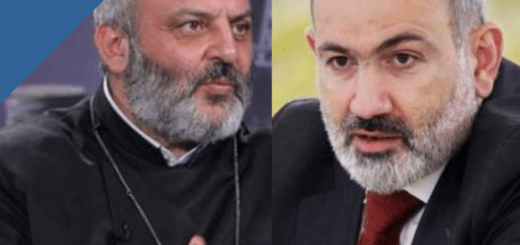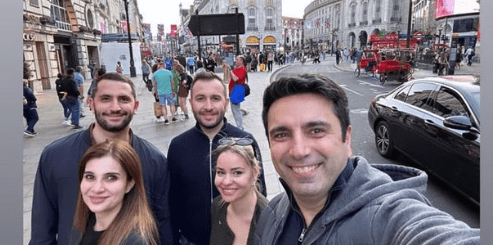Prime Minister Pashinyan Disparages Armenia’s Coat of Arms & National Anthem
With each passing day, the situation is getting worse in Armenia and Artsakh because of Prime Minister Nikol Pashinyan’s endless compromises to Azerbaijan and Turkey, his defeatist attitude and incompetence.
Coming to power, he misrepresented himself as a democrat, but soon turned out to be a dictator. Five years ago, Pashinyan promised at a huge public rally: “If in the result of the process of [Karabagh] negotiations there will be an option for settlement that I would personally consider to be a good option, let no one think that I will sign any confidential paper or take any secret action. If I see that there is an option that really needs discussing, I will come, stand here and present to you all the details, after which you decide whether to accept that settlement option or not. If you decide to do it, we will do it. If you decide that we are not, we will not do it. You are the supreme authority and you will have the final say. There can be no doubt.” However, ever since that solemn pledge in 2018, he has not asked the people to make a single decision on any issue.
Pashinyan:
— Made threatening statements against his political opponents, jailed his party’s rivals in local elections, had protesters arrested, and banned prominent Diaspora Armenians from entering Armenia because of their criticism of his regime;
— Divided Armenia’s population into two hostile camps and alienated the Diaspora from Armenia;
— Completely mismanaged the 2020 disastrous war resulting in the deaths of thousands of young Armenian soldiers and the loss of most of Artsakh;
— Failed to secure the release of Armenian prisoners of war from Azerbaijan;
— Was unable to protect Armenia’s borders from repeated Azeri attacks in the last two years;
— Was unable to open the Lachin Corridor blockaded by Azerbaijan for six months, resulting in the deprivation of 120,000 Artsakhtsis from food and medicines;
— Repeatedly criticized Armenians’ yearning for Mount Ararat, saying that it is no longer in Armenia’s territory.
— Weakened Armenia’s military;
— Dismissed Armenian claims to Western Armenia by announcing that Armenia has no territorial demands from any of its neighbors;
— Traveled to Ankara to attend Pres. Erdogan inauguration, embarrassing himself and Armenia;
— Gifted Artsakh to Azerbaijan. Contrary to Pashinyan’s misrepresentation that Armenia’s former leaders have given away Artsakh, Josep Borrell, High Representative of the European Union for Foreign Affairs and Security Policy, said last week: “For the first time… Armenia has recognized Karabagh as part of Azerbaijan.”
No wonder, Aliyev and Erdogan are pleased with Pashinyan.
Last week, while addressing the Parliament, Pashinyan made questionable statements about Armenia’s coat of arms and national anthem, both of which are enshrined in Armenia’s Constitution. In other words, Pashinyan’s criticisms were anti-constitutional.
Here is how Pashinyan described Armenia’s coat of arms: “What is depicted there? Noah’s ark on Mount Ararat; the emblems of the four thrones, dynasties, kingdoms…. Moreover, what has that emblem to do with the state founded in 1991? Looking at the center [of the emblem], Noah’s ark is on Mount Ararat; today’s territory of Armenia’s Republic is under floods; and a lion that has not lived here for a long time under normal conditions.” This is “about the duality that exists in each of us, historical Armenia and real Armenia…. Should real Armenia serve historical Armenia or should historical Armenia serve real Armenia? … After all, six of the 12 capitals of historical Armenia are located in the territory of the Republic of Armenia. And when was the last time you were in those capitals. Did you see their condition? Did you assess their condition? We are talking so much about traditions; we are talking about the values; our capitals. Our historical symbols are in ruins today. Forgive me, this is also not something to say, but certain [historical] capitals located outside Armenia may turn out to be in better condition than those located in the territory of the Republic of Armenia.”
Closing his remarks, Pashinyan did not miss the opportunity to also complain about another one of Armenia’s state symbols—the national anthem—on the very day that Armenia celebrated the Day of State Symbols. He said: “Today, the official words of our anthem end as follows: it ends in ‘sacrifice.’ The ideology itself is correct, so I don’t have any problem with the text, but it ends with a ‘sacrifice’ line and ‘sacrifice’ scene. I’ve been thinking a lot lately, of course, it may not be easy to implement from a purely esthetic, poetic point of view, but I think it would be very correct from a political point of view for the anthem of the Republic of Armenia to end with the following lines: ‘Look at it, our sacred sign in three colors, let it shine against the enemy, let Armenia be always glorious.’”
Pashinyan was suggesting shortening the anthem by cutting its last four lines: “Death is the same everywhere, a man will die but once, but blessed is the one who is sacrificed for the freedom of his nation.” This is yet another attempt by Pashinyan to weaken the nationalistic feelings of Armenians to appease Armenia’s enemies. The lyrics of the anthem were written by well-known poet Mikayel Nalbandian in 1861. The anthem was adopted by the first Republic of Armenia in 1918. It was readopted by the current Republic of Armenia with minor wording changes.
What will Pashinyan suggest next: Changing Armenia’s flag and the country’s name? Yet, this is the same man who self-righteously declared: “I can’t imagine a man who can love my homeland more than me. Such a thing is not possible. It is out of question.” Even the Soviets kept Mount Ararat on Soviet Armenia’s coat of arms. How can the Prime Minister of independent Republic of Armenia be less nationalistic than the leaders of Soviet Armenia?







